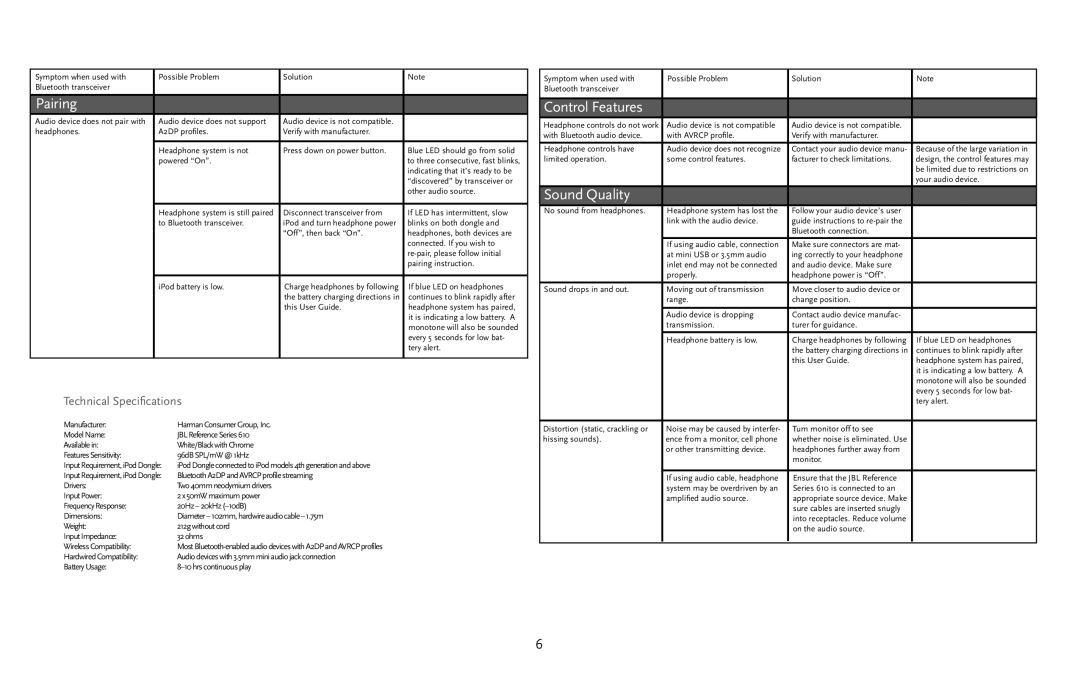Symptom when used with | Possible Problem | Solution | Note | |
Bluetooth transceiver |
|
|
|
|
Pairing |
|
|
|
|
Audio device does not pair with | Audio device does not support | Audio device is not compatible. |
| |
headphones. | A2DP profiles. | Verify with manufacturer. |
| |
|
|
|
| |
| Headphone system is not | Press down on power button. | Blue LED should go from solid | |
| powered “On”. |
| to three consecutive, fast blinks, | |
|
|
|
| indicating that it’s ready to be |
|
|
|
| “discovered” by transceiver or |
|
|
|
| other audio source. |
|
|
|
| |
| Headphone system is still paired | Disconnect transceiver from | If LED has intermittent, slow | |
| to Bluetooth transceiver. | iPod and turn headphone power | blinks on both dongle and | |
|
|
| “Off”, then back “On”. | headphones, both devices are |
|
|
|
| connected. If you wish to |
|
|
|
| |
|
|
|
| pairing instruction. |
|
|
|
| |
| iPod battery is low. | Charge headphones by following | If blue LED on headphones | |
|
|
| the battery charging directions in | continues to blink rapidly after |
|
|
| this User Guide. | headphone system has paired, |
|
|
|
| it is indicating a low battery. A |
|
|
|
| monotone will also be sounded |
|
|
|
| every 5 seconds for low bat- |
|
|
|
| tery alert. |
|
|
|
| |
Technical Specifications |
|
| ||
Manufacturer: |
| Harman Consumer Group, Inc. |
|
|
Model Name: |
| JBL Reference Series 610 |
|
|
Available in: |
| White/Black with Chrome |
|
|
Features Sensitivity: |
| 96dB SPL/mW @ 1kHz |
|
|
Input Requirement, iPod Dongle: | iPod Dongle connected to iPod models 4th generation and above |
| ||
Input Requirement, iPod Dongle: | Bluetooth A2DP and AVRCP profile streaming |
| ||
Drivers: |
| Two 40mm neodymium drivers |
|
|
Input Power: |
| 2 x 50mW maximum power |
|
|
Frequency Response: |
| 20Hz – 20kHz |
|
|
Dimensions: |
| Diameter – 102mm, hardwire audio cable – 1.75m |
| |
Weight: |
| 212g without cord |
|
|
Input Impedance: |
| 32 ohms |
|
|
Wireless Compatibility: |
| Most |
| |
Hardwired Compatibility: |
| Audio devices with 3.5mm mini audio jack connection |
| |
Battery Usage: |
|
|
| |
Symptom when used with | Possible Problem | Solution | Note |
Bluetooth transceiver |
|
|
|
|
|
|
|
Control Features |
|
|
|
Headphone controls do not work | Audio device is not compatible | Audio device is not compatible. |
|
with Bluetooth audio device. | with AVRCP profile. | Verify with manufacturer. |
|
Headphone controls have | Audio device does not recognize | Contact your audio device manu- | Because of the large variation in |
limited operation. | some control features. | facturer to check limitations. | design, the control features may |
|
|
| be limited due to restrictions on |
|
|
| your audio device. |
Sound Quality |
|
|
|
No sound from headphones. | Headphone system has lost the | Follow your audio device’s user |
|
| link with the audio device. | guide instructions to |
|
|
| Bluetooth connection. |
|
| If using audio cable, connection | Make sure connectors are mat- |
|
| at mini USB or 3.5mm audio | ing correctly to your headphone |
|
| inlet end may not be connected | and audio device. Make sure |
|
| properly. | headphone power is “Off”. |
|
Sound drops in and out. | Moving out of transmission | Move closer to audio device or |
|
| range. | change position. |
|
|
|
|
|
| Audio device is dropping | Contact audio device manufac- |
|
| transmission. | turer for guidance. |
|
| Headphone battery is low. | Charge headphones by following | If blue LED on headphones |
|
| the battery charging directions in | continues to blink rapidly after |
|
| this User Guide. | headphone system has paired, |
|
|
| it is indicating a low battery. A |
|
|
| monotone will also be sounded |
|
|
| every 5 seconds for low bat- |
|
|
| tery alert. |
|
|
|
|
Distortion (static, crackling or | Noise may be caused by interfer- | Turn monitor off to see |
|
hissing sounds). | ence from a monitor, cell phone | whether noise is eliminated. Use |
|
| or other transmitting device. | headphones further away from |
|
|
| monitor. |
|
|
|
|
|
| If using audio cable, headphone | Ensure that the JBL Reference |
|
| system may be overdriven by an | Series 610 is connected to an |
|
| amplified audio source. | appropriate source device. Make |
|
|
| sure cables are inserted snugly |
|
|
| into receptacles. Reduce volume |
|
|
| on the audio source. |
|
|
|
|
|
